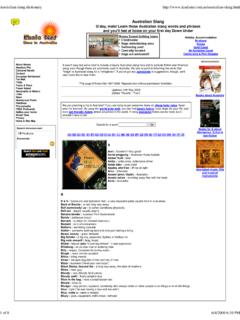Transcription of Panic - Bassett Road Surgery
1 Panic A Self Help Guide 2 What is a Panic attack? Everyone knows what Panic is, and it is common to feel panicky from time to time: You get the sense that you are being followed on your way home from a party, late at night. You discover you have had your wallet stolen. You are sitting an exam. You look at the paper and realise you don t know the answers to any of the questions. Someone runs in front of your car and you almost hit them. It would be normal in any of these situations to feel a sense of Panic . The feeling would be understandable and would pass fairly quickly. A Panic attack is a bit like 'normal' Panic , but different in a number of ways: The feelings seem to come 'out of the blue' and are not usually related to the sort of frightening situation described above.
2 The feelings are a lot stronger. As the feelings are UNEXPECTED and STRONG they can feel extremely frightening. 3 Panic attacks affect people in many different ways, but there is usually a frightening feeling that something really awful is about to happen. THE TRUTH IS: NOTHING AWFUL IS GOING TO HAPPEN, AS Panic ATTACKS ARE NOT DANGEROUS. Lots of people have Panic attacks, although they can affect people in different ways. Some people have only one, others may have them for many years. Some people have them every day, some people only once in a while. If you were to ask all of your friends if they had ever had a Panic attack, it is very likely that at least one or two will have had the same experience. They are quite common and NOT a sign of serious mental or physical illness.
3 Some non-serious physical conditions can cause symptoms similar to Panic attacks. For example: certain medicines taken together; thyroid problems; drinking too much caffeine; 4 pregnancy; low blood sugar; etc If, after reading this leaflet, you are concerned that your problem may have a physical cause and you have not yet had a check-up from your GP, then it may be a good idea to make an appointment. This booklet aims to help you reduce your Panic attacks by helping you to: Recognise whether or not you are having Panic attacks. Understand Panic , what causes it and what keeps it going. Accept that Panic cannot harm you. Learn techniques to reduce Panic . 1. Recognising Panic How do I know if I am having a Panic attack?
4 This may sound obvious, but it isn t. Sometimes Panic feels so awful, and comes so out of the blue , that people can t quite believe that it s only a Panic attack, and think it must be something more serious. The feeling of a Panic attack can SUMMARY: Panic attacks are very common. They are NOT dangerous and are NOT a sign of serious mental or physical illness. 5 be so unusual that you may not even realise this is what is happening. One of the most important first steps in overcoming Panic attacks is recognising whether or not your symptoms are caused by a Panic attack. Panic affects your body, your mind and the way you behave. The following are some of the most common symptoms experienced by people having a Panic attack.
5 Some people have all of the symptoms, others just a few. Your Body (please tick those that apply) Heart pounding, beating fast or skipping a beat Heart seems to stop, followed by a big thud, chest pains. Changes in your breathing, either gulping air, breathing fast or feeling short of breath. Pounding in your head. Numbness or tingling in fingers, toes or lips. Feeling as though you can t swallow, feeling sick. Feeling as though you re going to faint, wobbly legs. Write down any other symptoms:.. 6 Your Mind (please tick any thoughts or feeling that apply) Feelings of utter terror. Feelings of unreality, as though you re not really there. You feel anxious in situations where you had a Panic attack before.
6 Frightening thoughts such as: I m going to have a heart attack. I will collapse or faint. I m running out of air. I m going mad. I m choking. I m going to be sick. I m losing control. I m going to make a complete fool of myself. I ve got to get out of here. 7 Write down any other frightening thoughts or feelings: .. Remember these things never actually happen in a Panic attack, but people sometimes think they will. What you do/your behaviour (please tick any of these that apply to you) YOU AVOID: situations that have caused Panic or that you fear might cause Panic , for example going shopping. ESCAPE as soon as you can when panicking, for example, rushing round the supermarket to get out as soon as possible.
7 PREVENT what you think is going to happen, by doing something to make yourself safe, for example, gulping air if you think you are going to suffocate or sitting down if you think you are going to faint, or lying down if you think you are having a heart attack or scanning your body for evidence of something being wrong. 8 SEEK HELP In one study a quarter of all people having their first Panic attack called an ambulance or went to accident and emergency, they were so convinced something dangerous was happening to them. Perhaps you have done this, or called out the doctor? COPE People often try to cope with a Panic attack by doing things they have found or have been told are helpful, for example, distracting themselves or trying to relax.
8 Write down anything else you do or don t do as a result of having a Panic attack: .. Whilst all of these things can help to stop a Panic attack, as we shall see later, they can also become part of the problem. If you have ticked quite a few of these symptoms, thoughts and behaviours, then it is likely that you are suffering from Panic attacks. 9 2. Understanding Panic - What causes it and what keeps it going? All of the Panic symptoms described above are nothing more than an extreme form of fear. Fear is our body s natural response to a situation perceived as threatening. Fear can range from mild anxiety (which can be helpful SUMMARY: Recognising a Panic attack. A Panic attack is a strong feeling of terror that comes on very suddenly.)
9 Physical symptoms include, pounding hearts, fast breathing, shaking, wobbly legs. People often have lots of frightening thoughts and think something awful is happening. They often try to avoid or escape the Panic . But Panic is not dangerous or harmful 10 But why have fear at all when it s such an unpleasant feeling? In a way, it is a bit like pain. If you were to break your ankle, it would feel very painful, which would be a warning to you not to walk on it. If you heard a noise downstairs at night, you might feel frightened, which is a warning that you might have to deal with a dangerous situation. Fear is very useful. It prepares your body for action. This has been called the fight or flight response. So that when you feel fear, what is happening is that your body is preparing to fight or run away from the thing it feels threatened by, or possibly to stay completely still and wait for the threat to pass.
10 If we take the example of the noise downstairs. Let us suppose it is a burglar, as you fear. You may wish to stay absolutely still, so as to prevent the burglar from attacking you. You might want to go and challenge him or you might need to run away should he come after you. Your fear response would help with any of these. When you are frightened you breathe more quickly so that you can get lots of oxygen to your muscles. Your heart beats faster to pump the blood faster round your body. Your digestive system closes down to allow your body to concentrate on the more immediate threat. This is your body s normal healthy reaction to situations where your body feels under threat It is your body s alarm system. The problem with Panic attacks is that usually they occur when there is no obvious physical threat there at all.







